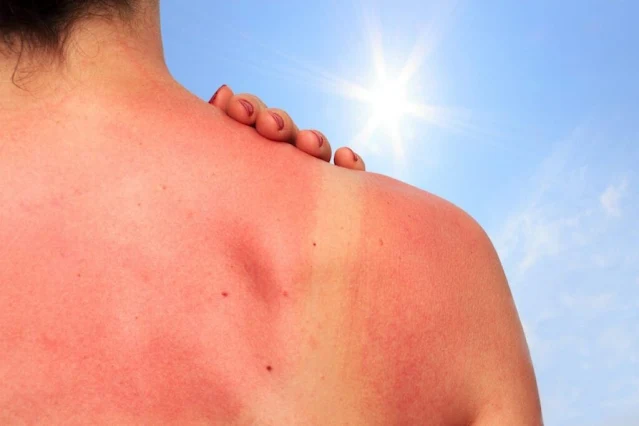You're best off using a safe sunscreen (like zinc oxide) to shield your skin from UV rays. However, did you know that eating certain healthful foods can strengthen your skin's defenses against aging, damage, and even cancer?
Plants naturally defend themselves against the sun's harmful rays. Consuming these plant-based foods exposes you to their protective compounds, which enhance your skin's natural defenses.
Science Indicates Foods Can be Skin Protective
The University of Maryland Medical System claims that consuming particular foods can lower your chance of developing skin cancer. Research has indicated that antioxidants in many of these foods may provide protection, even though there aren't any scientific studies that have yet to compare and measure the effectiveness of different foods in protecting the skin.A study published in 2010 came to similar conclusions, though it added that food nutrients can protect not only against skin cancer, but photo-oxidative damage that leads to skin aging. Scientists noted that antioxidant vitamins, minerals, and phytochemicals, in addition to essential fatty acids, have demonstrated protective properties. They added that the presence of these nutrients in the traditional Greek-style Mediterranean diet may have contributed to the low levels of melanoma there, despite the population’s exposure to high levels of solar radiation.
“The increasing incidence of skin cancer despite the use of externally applied sun protection strategies,” said Niva Shapira, lead author, “alongside research showing that nutrients reduce photo-oxidative damage, suggest nutritional approaches could play a beneficial role in skin cancer prevention.”
Some of the Best Choices
Though many foods may offer sun protection, below are a few of those with the most promise so far, though we’re always finding out about new super foods.
1. Apples: Surprised? A Japanese study actually found that apple polyphenol extracts, particularly flavonids called “procyanidins,” inhibit skin cancer in mice. Another polyphenol, quercetin, protected DNA from human skin cancer cells.
2. Green Tea: Yes, it’s a beverage, but it’s got powerful antioxidants. The University of Maryland Medical Center says it contains polyphenols, potent antioxidants that have shown in studies to help prevent skin tumors from starting or growing.
3. Dark Chocolate: Another reason to indulge now and then, dark chocolate has powerful antioxidants that may help protect from sunburn.
4 and 5. Olive Oil and Tomato Paste: Did you need another reason for using these health-filled goodies, often critical in flavorful pasta sauces? Here it is. German studies found that those subjects consuming about 2 teaspoons of olive oil and about ¼ cup of tomato paste daily for 10 weeks experienced 35 percent less reddening when exposed to sunlamps than those who didn’t eat these items. In addition, research from the University of Michigan found that lycopene and other antioxidants in tomatoes can help prevent the skin from becoming sunburned.
6. Broccoli: Research from the Johns Hopkins School of Medicine exposed areas of volunteers’ skin to intense ultraviolet light one to three days after applying a broccoli-sprout extract to the same area. The extract was all but rubbed away by the time of the exposure, but those areas had, on average, 37 percent less redness and inflammation. Simultaneous animal studies showed that mice treated with the extract had significantly fewer and smaller skin tumors after exposure to UV rays. Scientists say that broccoli turns on the body’s natural cancer-fighting machinery, and once turned on, it works for days. The lead researcher of the study recommended eating one-half cup of broccoli each day to protect against skin cancer.
7. Green, Leafy Vegetables: This includes kale, spinach, and chard. According to an Australian study, these could decrease skin cancer risk. Scientists studied over 1,000 adults living in Australia over an 11-year period, and found that increasing intakes of green leafy vegetables was associated with a 41 percent decreased risk of skin cancer. These vegetables are rich in folic acid, which plays a key role in DNA synthesis and repair. In addition, researchers also examined those participants that previously had skin cancer, and found that those who did had a 55 percent decrease in skin cancer with increasing intakes of green leafy vegetables. “Our findings show that higher intakes of green leafy vegetables may help prevent Squamous cell carcinoma (SCC) tumors among people who have prior skin cancers,” the researchers stated.
Homemade Sunscreen
Ingredients:
- 10 drops lavender
- 1 tbsp pomegranate oil
- 3/4 C coconut oil
- 2 tbsp Zinc Oxide
- 2 tbsp shea butter
- Glass Jar
Instructions:
- Combine all ingredients except zinc oxide in a jar.
- Place a saucepan with 2 inches of water on stove over medium/low heat.
- Place jar in saucepan and stir contents until ingredients start to melt.
- Once all ingredients are combined, add in zinc oxide and stir well. Store in a cool place.
Do you modify your diet in the summer to protect your skin? Please share your tips.
Sources:
Niva Shapira, “Nutritional Approach to Sun Protection: A Suggested Complement to External Strategies,” Nutrition Reviews, February 2010, http://onlinelibrary.wiley.com/doi/10.1111/j.1753-4887.2009.00264.x/abstract.
Apple Polyphenols, A Potent Antioxidant—Health and Medical Information,http://www.applepolyphenols.com/studies/skincancer.htm.
“How can my diet help protect me from sunburn?” WHFoods, http://whfoods.org/genpage.php?tname=dailytip&dbid=344.
Tanya Zuckerbrot, “Tomatoes: A Natural Sunblock for Your Skin,” Fox News, January 12, 2012,http://www.foxnews.com/health/2012/01/11/tomatoes-natural-sunblock-for-your-skin/.
Rick Weiss, “Broccoli Extract Could Help Head Off Skin Cancer,” Washington Post, October 23, 2007,http://www.washingtonpost.com/wp-dyn/content/article/2007/10/22/AR2007102201377.html.
“Green leafy vegetables decrease skin cancer risk,” China Daily, July 29, 2006,http://www.chinadaily.com.cn/life/2006-07/29/content_652780.htm.
